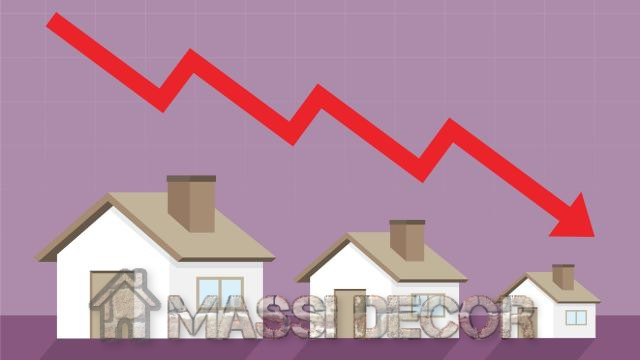Table of Contents
Brace for Impact: Will the Housing Market Crash?
Cue the Jaws theme song, folks. Based on recent data, some analysts are warning that the housing market crash may be drifting into dangerous territory. Just like how the Amity Island beachgoers didn't see Jaws coming, potential homebuyers and sellers need to be aware of signs that the housing market could take a turn.
But before you panic and start yelling "We're gonna need a bigger boat!", let's take a balanced look at factors that could indicate a housing downturn versus reasons the market may stay afloat. Here are key questions to consider when assessing if the housing market is headed for a crash or just a correction.
Is There a Supply Surplus?
Remember the toilet paper shortages of 2020? When supply was low and demand spiked, prices went through the roof. The housing market has seen the opposite scenario play out - more supply coming online while buyer demand has cooled off.
There were 1.31 million new and existing homes available for sale in August 2022, a 7.2% increase over July. This surplus of inventory gives buyers more choices and less competition. Sellers may need to lower prices to attract buyers, causing housing prices to soften. Just like in Mean Girls, when supply is plentiful, real estate doesn't have the same "you can't sit with us" level of exclusivity.
However, context is important - the housing supply is still low compared to pre-pandemic levels. There were 1.56 million homes for sale in August 2019. And the U.S. population has grown significantly since then. So while supply has increased, it may not yet be excessive enough to trigger a major market correction.
Are Mortgage Rates Deterring Buyers?
Cue the sad Charlie Brown music - today's mortgage rates are a far cry from the unprecedented lows of the past two years. The average 30-year fixed rate mortgage recently topped 7%, the highest level since 2002. This contrasts sharply with rates below 3% in 2021. Rising rates decrease affordability and buying power, pricing some would-be buyers out of the market.
These higher rates reduce demand, yet sellers often lag in adjusting their price expectations. It takes time for supply and demand to recalibrate. So higher mortgage rates could very well dampen bidding wars and limit home price appreciation in the near term.
But there are also potential tailwinds. inflation may be peaking, and if price pressures ease, the Fed could slow its pace of rate hikes. This could allow mortgage rates to stabilize or even drift back down, reigniting buyer demand.
Are Home Prices Dropping Significantly?
Home prices surged over the past two years, fueled by low rates, scarce supply, and flexible remote work options. The median home price hit record highs, rising over 20% annually at times. This breakneck appreciation simply wasn’t sustainable long-term.
Recent monthly data shows the rapid home price growth pace moderating. For example, August 2022 saw the lowest yearly home price gain for existing home sales in two years. This deceleration is healthy and indicates the market is starting to stabilize.
Home prices have eased a bit but are still up solidly year-over-year. There have not been any huge month-over-month declines that would point to an imminent crash. As supply and demand rebalance, expect home price appreciation to keep trending down from the feverish highs of 2021, settling into a more typical 4-5% annual range.
Are Foreclosures Increasing?
During the housing crisis of 2008, a surge of foreclosures and distressed property sales triggered a sharp market downturn. Foreclosure rates have remained low in recent years. However, there are some concerns that financial hardship could lead to increasing defaults.
Factors like job losses, interest rate resets, or tenants falling behind on investor-owned properties could drive up foreclosures. This would subsequently increase the supply of discounted homes on the market.
However, lenders have not loosened underwriting standards in recent years like they did pre-2008. The vast majority of borrowers are in a much better financial position than in the lead-up to the last housing crash. Loan forbearance and hardship programs also help struggling homeowners avoid foreclosure. While defaults bear monitoring, they do not appear likely to spike drastically higher and dump excessive inventory on the market.
Conclusion
While the current housing market conditions may not be quite as dire as Amity Island beachgoers hearing the Jaws theme song, caution is warranted. Buyers should temper expectations and not feel pressured or desperate. Sellers need to price homes appropriately and avoid waiting for “shark-infested” bidding wars.
But there are also positive factors providing support and preventing an epic housing market crash. Supply, while increasing, remains below historical norms relative to population growth. Mortgage rates may find an equilibrium and stabilize. Home prices are easing at an unsustainable pace but not seeing huge declines. Foreclosures still appear relatively limited.
The housing market and economy have changed significantly since 2008. While slowing home price appreciation and sales activity are likely in the coming months, key metrics do not point to conditions severe enough to trigger a devastating crash. By staying informed and making prudent decisions, buyers and sellers can successfully navigate any housing downturn. With preparation and perspective, it’s possible to avoid worst-case scenarios. Cautious optimism may be the most prudent approach for now.
FAQs
- How long could a housing market downturn last?
Housing market downturns can vary greatly. In the 2008 crash, home prices declined for about 3.5 years before hitting bottom. However, projections for any potential housing slump now are much milder. Most experts estimate home price declines would be smaller and last 1-2 years.
- What areas are most at risk for a housing crash?
Markets that saw the steepest home price gains, like Phoenix, Las Vegas, and many Florida markets, could be more vulnerable to a larger price correction. Areas with strong job growth, affordable home prices, and population inflows may fare better.
- Will mortgage rates keep going up?
It depends on inflation and Federal Reserve actions. If inflation eases, the Fed could slow interest rate hikes, helping stabilize mortgage rates. But if not, further Fed hikes could push rates higher in the near term before leveling off.
There's no universal answer. Consider your timeline and goals. Buying may still make sense if you find a home meeting your needs at a price you can afford. Selling may be opportune if you reap healthy gains from price appreciation. But go in informed.
- How can I prepare for a potential housing downturn?
Save more for a larger down payment. Opt for a fixed-rate mortgage. Consider adjustable-rate mortgages cautiously. Get pre-approved early in your home search. Evaluate your budget and job outlook in case of financial changes. Don't panic - downturns are normal housing market cycles.
References:
National Association of Realtors housing data https://www.nar.realtor/research-and-statistics/housing-statistics/existing-home-sales
Freddie Mac Primary Mortgage Market Survey https://www.freddiemac.com/pmms
S&P Case-Shiller Home Price Index monthly reports https://www.spglobal.com/spdji/en/index-family/indicators/sp-corelogic-case-shiller/
Massi Decor is supported by our readers. We may earn small commissions when you make purchases through referral links on our site. This does not impact our recommendations, which are guided solely by our editors' objective assessments. We only recommend products that meet our high standards. Today's Deals



